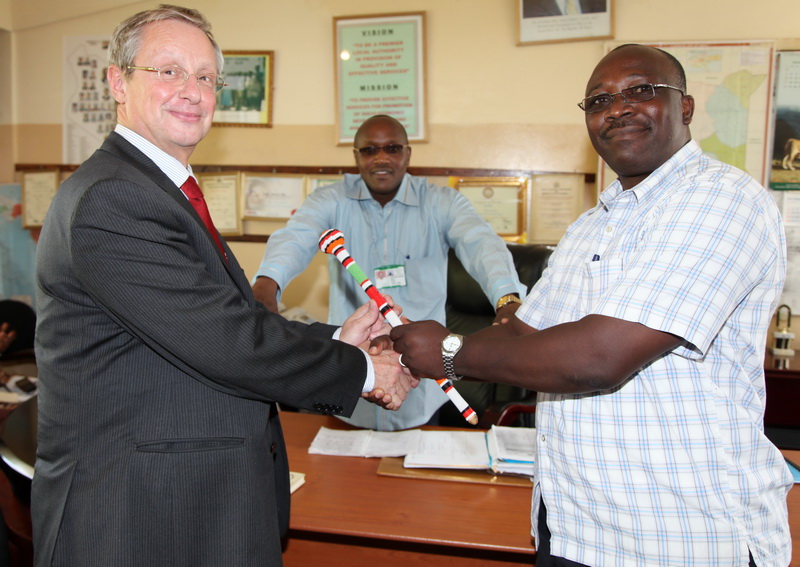During the European Development Days 2012 (EDD), organisations dealing with urbanisation such as the United Nations Human Settlements Programme (UN-HABITAT) and Slum Dwellers International (SDI) said that the only way to improve life in cities is to build partnerships among the inhabitants, and to strengthen local initiatives.
With half of the world’s population living in cities, the gap between the poor and the rich is widening in countries where the GDP is growing. Development practitioners stressed that inclusivity in the decision-making process is the only way to avoid the trend where the leadership is being influenced by the minority, preventing equity among the various stakeholders.
UN-HABITAT Deputy Executive Director Aisa Kirabo Kacyira said the best path to aid effectiveness is to work with local communities and the city’s own citizens. This will allow them to address their own needs directly to the local authorities, be it from dealing with the aftermath of a disaster, to addressing development goals such as upgrading their slums.
Such participation reinforces urban governance, which UN-HABITAT sees as a key pillar when promoting sustainable urban planning, urban economy or housing.

Partnership with local leadership under participatory slum upgrading programme in Mtwapa, Kenya
Copyright: UN-HABITAT / Julius Mwelu
This continuous dialogue is forged into policies at the UN Governing Council – a subsidiary body of the UN General Assembly – held every two years, Ms Kirabo explained.
“It’s only through inclusive growth that the city dwellers can do their best, otherwise they become passive recipients or even a cause of risk to development,” she said.
According to UN-HABITAT, urban divide remains one of the biggest challenges.
Ms Kirabo explained that a European Commission supported programme run by UN-HABITAT looked at participatory slum upgrading with success in 66 cities across 29 countries, fostering slum prevention and sustainable urbanisation.
“People come out much stronger when they participate in development,” she pointed out.
Launched in 2008, the Participatory Slum Upgrading Programme (PSUP) aims to improve living conditions in slums, through the promotion of good governance and management approaches, capacity building, and policy development. Currently, 38 countries and 62 cities across the African, Caribbean and Pacific (ACP) states are participating in the programme.
With an initial budget of €4 million provided by the EC and its intra-ACP fund in 2008, and a further €10 million provided in 2012, the European Commission is supplying 55% of the programme’s budget.
The programme comprises three phases:
- Identification of each participating city's "Urban Profile" (analysis of the local context, challenges and needs)
- Action Planning and Programme Document Formulation (prioritising of interventions, development of frameworks, identification of funding sources, creation of networks for slum upgrading initiatives)
- Pilot project implementation (municipal authorities, regional and central governments are supported to implement some of the tangible projects identified)
Umuganda: a traditional example from Rwanda
Before joining UN-HABITAT, Ms Kirabo was the mayor of Kigali, the capital of Rwanda, at the time when the city received the UN-HABITAT Scroll of Honour Award in recognition of the high level of cleanliness, greenness and safety.
Drawing from her own cultural background, Kirabo took the example of the typical Rwandan “Umuganda” system as a way to promote people’s participation in the local city-planning decision making process.
Through the Umuganda system, on the last Saturday of the month, people “at grass-roots level” gather together and take part in unpaid communal work to improve life in the community. This traditional system also exists in other parts of Africa, but in Rwanda it is compulsory and has developed into a policy. Members of the community gather in a local Parliamentary-type session, identify a challenge that affects the community and then deal with it, Ms Kirabo explained.
According to her, this expresses inclusiveness at its highest level and is one of the best practices in Rwanda because it allows people to engage with the community, to avoid loneliness and to avoid losing human development, which is often the downside of urbanisation.
Inclusivity is the main lesson learned from this system, she said.
“When we listen to the communities, they upgrade their slum, create employment and improve livelihoods”.
On a more general note, she said that the approach to deal with urbanisation should go beyond housing and include the land legislative process and existing capacities. “We need to come up with a process that empowers people to build a resilient community, offering them employment at the same time.”
Sharing similar objectives, Celine D’Cruz, a coordinator of Slum Dwellers International said that slum dwellers are capable of presenting their own views and negotiating with the city governments for basic housing rights, but only if they are organised and empowered.
Slum Dwellers International is a network of community-based organisations of the urban poor in 33 countries in Africa, Asia and Latin America. It was launched in 1996 and stemmed from the initiative of urban poor groups, who decided to organise themselves into a global platform.
As an example, in Dharavi, one of Asia’s largest slums forming part of the city of Mumbai, as many as 800 people shared one toilet facility. An increase in sanitation facilities was obtained after the residents organised themselves and launched a complaint to the city council: they presented the government with the statistics and a research-based request of what was needed.
As lessons learned, both UN-HABITAT and Slum Dwellers International stress the need to open the space between communities and city governance and call on big development partners like the European Commission to talk to local authorities and ease dialogue when needed.
“The government will listen,” said D’Cruz.
|
Since the European Development Days 2012, the Rabat Declaration on Making Slums History was unanimously adopted by country delegations at the closing ceremony of an international conference on 26-29 November 2012, in Rabat, Morocco. For more information please visit: http://www.urbangateway.org/documents/resolution-declaration/rabat-decl… You can view a playlist of further interviews on this subject on the UN-HABITAT YouTube channel, including an interview with Denis Salord, from DG EuropeAid, European Commission. Denis Salord is Head of Unit for Sub-Saharan Africa and ACP wide Regional Programmes. |
This collaborative piece was drafted with input from Aisa Kirabo Kacyira, Celine D’Cruz, and Plácido Hernández, with support from the capacity4dev.eu Coordination Team. The image is courtesy of Julius Mwelu (UN-HABITAT) and is copyright protected.

Log in with your EU Login account to post or comment on the platform.